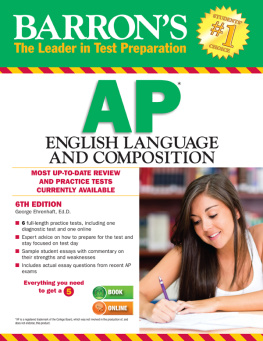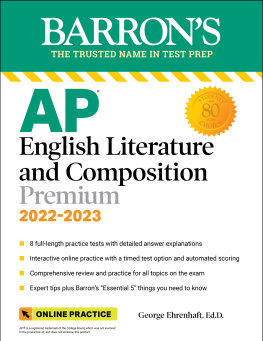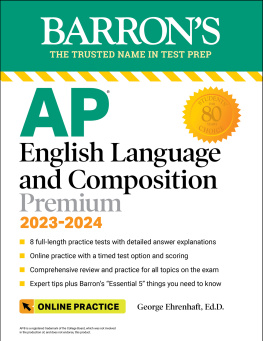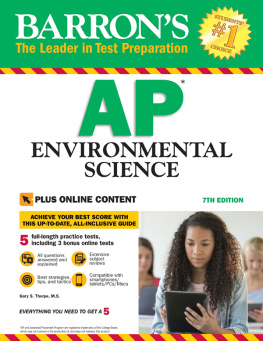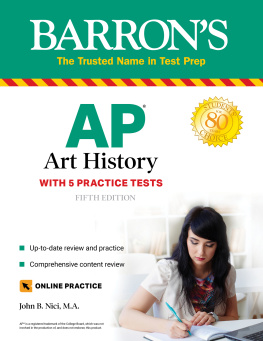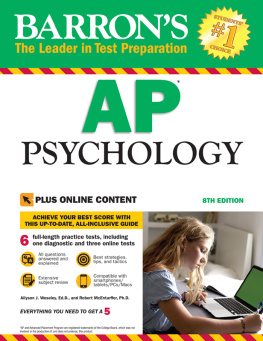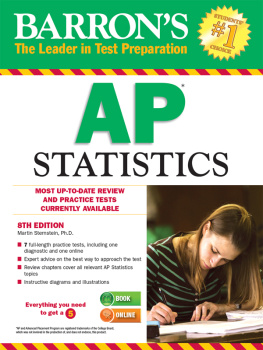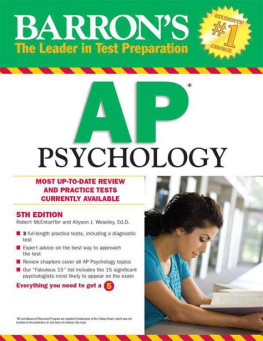Now Available!

Go to barronsbooks.com/AP/englang/ to take a free sample AP English Language and Composition test, complete with answer explanations and automated scoring.
*This online test was created for devices that support Adobe Flash Player. To access the test on an Apple iPad or iPhone you will need to install a web browser that supports Flash (check the iTunes App Store for free options).

Copyright 2015, 2013, 2012, 2010, 2008 by Barrons Educational Series, Inc.
Previous edition Copyright 2004 under the title How to Prepare for the AP English Language and Composition . Prior editions Copyright 2000, 1997, 1992, 1987, 1984, 1980, and 1974 under the title How to Prepare for AP English by Barrons Educational Series, Inc.
All rights reserved.
No part of this publication may be reproduced or distributed in any form or by any means without the written permission of the copyright owner.
All inquiries should be addressed to:
Barrons Educational Series, Inc.
250 Wireless Boulevard
Hauppauge, New York 11788
www.barronseduc.com
eISBN: 978-1-4380-6734-6
Revised e-Book publication: February, 2015
CONTENTS
If youre aiming for a score of on the AP English Language and Composition exam, this book can help. But to reach your goal, here are five things that you MUST do:
Familiarize yourself with the language of rhetoric. Both the short-answer and essay questions require that you know how authors employ rhetorical strategies to create effects and convey meaning. Become conversant with the functions of tone, syntax, imagery, irony, point of view, and the other rhetorical techniques.
Become an annotation addict. Nothing will build your skill in prose analysis better than a steady diet of annotation. Begin by reading nonfiction prose passages in this book and elsewhere. Resolve to figure out exactly what each author did to compose the passage. Identify rhetorical techniques, but more important, try to explain why the author chose each rhetorical component.
Review documentation basics. By learning the anatomy of footnotes youll be ready to answer multiple-choice questions that ask you to interpret documentation. Also, to earn a top score on the synthesis essay, know how to weave source material into your text and correctly document where it came from.
Brush up on basic grammar skills. Dont bother memorizing terminology. Few, if any, multiple-choice questions require it. Concentrate on writing error-free essays because essay scores suffer when grammar rules are broken. Proofread all your practice essays. Look particularly for
sentences errors
lack of agreement between subjects and verbs
incorrect pronoun usage
errors in verb choice
Plan and practice an essay-writing process. Develop a process for writing an essay in no more than forty minutes. Build in time to read the question, pick a main idea and decide how to support it. Before you start writing, list your ideas and arrange them in sensible order. While composing your essay, be mindful of the need to:
introduce your topic
develop coherent paragraphs
vary sentences
choose the best words to express ideas
provide a brief conclusion
Set aside time for editing and proofreading.
This e-Book will appear differently depending on what device you are using to view it on. Please adjust the settings on your device accordingly.
Use the hyperlinks in this e-Book to help you navigate through content, browse Internet resources, and click between practice questions and answers.

G rateful acknowledgment is made to the following sources.
Alfie Kohn, Homework: An Unnecessary Evil? www.psychology today.com , November 24, 2012.
Brian P. Gill and Steven L. Schlossman, My Dog Ate My Argument, Los Angeles Times, December 11, 2003.
Tom Loveless, Do Students Have Too Much Homework? Brown Center on Education Policy, Brookings Institution, October 1, 2003.
Brian Haley, What Is the Value of Homework? July 6, 2006. SearchWarp.com .
Gloria Chaika, Help! Homework Is Wrecking My Home Life, Education World , 8 August 2000 . EducationWorld.com.
F. M. Esfandiary, The Mystical West Puzzles the Practical East, New York Times Magazine , February 6, 1967. F. M. Esfandiary.
Clyde Kluckhorn, An Anthropologist Looks at the United States, Mirror for Man , McGraw-Hill Book Co., NY, 1949.
Richard Maxwell Brown, Historical Patterns of Violence In America, The History of Violence in America , eds. Hugh Davis Graham and Ted Robert Gurr. National Commission on the Causes and Prevention of Violence. Task Force on Historical and Comparative Perspectives, U.S. Government Printing Office, Washington, D.C.
M. Scott Momaday, The Way to Rainy Mountain , University of New Mexico Press, 1976.
Richard Wright, White Man, Listen! , John Hawkins & Associates, New York, 1957.
Daniel Goleman, The Man Without Feelings, Emotional Intelligence . Copyright 1995. Reprinted with permission of Bantam Books, a division of Random House, Inc.
Katherine Hansen, What Good Is a College Education Anyway? Quintessential Careers, < www.quintcareers.com >.
Lori Kurtzman, Remedial Classes Teach Freshmen What They Should Already Know, The Cincinnati Enquirer , posted online July 30, 2006.
Thomas D. Snyder and Charlene M. Hoffman, Relative Gains in NAEP Reading Scores, U.S. Department of Education, National Center for Education Statistics, Washington, D.C., 2002.
Gregg Toppo and Anthony DeBarros, Reality Weighs Down Dreams of College, USA Today , posted online February 2, 2005.
Online blog, Rob, Declining College Standards, Say Anything , posted January 3, 2006.
Ayn Rand, For the New Intellectual , New American Library, 1963. Printed in William J. Brandt, The Rhetoric of Argumentation , Bobbs Merrill, 1970.
Adlai E. Stevenson, Call to Greatness , Atheneum, 1962. Printed in William J. Brandt, The Rhetoric of Argumentation , Bobbs Merrill, 1970.
Joe B. Frantz, The Frontier Tradition: An Invitation to Violence, The History of Violence in America , ed. Hugh Davis Graham and Ted Robert Gurr, National Commission on the Causes and Prevention of Violence. Task Force on Historical and Comparative Perspectives, U.S. Government Printing Office, Washington, D.C.
J. H. Pryor, K. Eagan, L. Palucki Blake, S. Hurtado, J. Berdan, and M. H. Case, Trends of Reasons in Deciding to Go to College, The American Freshman: National Norms Fall 2012 , Los Angeles, CA: Higher Education Research Institute, UCLA, 2012.
Julie Hilden, Does Celebrity Destroy Privacy? FindLaw website, accessed 6/28/06.
jenblacksheep , Do Public Figures Have Privacy Rights? Hubpages.com , 2010.
Vincent M. deGrandpr, Understanding the Market for Celebrity, An Economic Analysis of the Right of Publicity, Simpson Thacher and Bartlett, LLP, posted 15 September 2001, .
Entertainment to Environment Headlines of Prominent News Sources (Ratio of 5 to 1 or Greater), Pew Research Centers Project for Excellence in Journalism, 2013.
GNL, For Todays Public Figures, Private Lives Really Matter, www.Buzzle.com., ....? Buzzle.Com, Inc., Costa Mesa, CA, November 30, 2004.
Jamie Nordhaus, Celebrities Rights to Privacy: How Far Should the Paparazzi Be Allowed to Go? University of Texas School of Law, Review of Litigation , Volume 18, 1999.

